List of World War II firearms of Germany
- Note: Weapons listed were made by or for Germany and do not include captured foreign equipment.
Pistols
| Picture | Name | Manufacturer | Cartridge | Primary User | Note | References |
|---|---|---|---|---|---|---|
| Astra 300 | Astra-Unceta y Cia SA | 7.65×17mm SR 9×17mm Kurz |
Luftwaffe | 85,390 delivered from 1941 to 1944.[1] | [2] | |
| Astra 400 | Astra-Unceta y Cia SA | 9×23mm Largo | - | 6,000 purchased in 1941.[1] | [3] | |
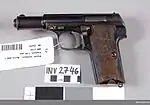 |
Astra 600 | Astra-Unceta y Cia SA | 9×19mm Parabellum | - | 10,450 Astra 600s had been delivered to Germany until German occupation of France ceased.[4] The remainder of the German order, consisting of 28,000 pistols, was intercepted by Allied forces in September 1944.[1] | [3] |
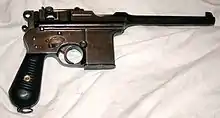 |
Astra 900 | Astra-Unceta y Cia SA | 7.63×25mm Mauser | Wehrmacht | 1,050 delivered in March 1943. | [1] |
 |
Browning Hi-Power | Fabrique Nationale d'Herstal | 9×19mm Parabellum | Waffen-SS Fallschirmjäger |
319,000 manufactured under German occupation. Designated Pistole 640(b) in German service. | [5] |
 |
ČZ vz. 27 | Böhmische Waffenfabrik (Czech made under German occupation (after mid-March 1939)) | 7.65 mm Browning/.32 ACP | Wehrmacht, SS, Police | All ČZ 27's Produced for German use were all marked on the slide with "Pistole Modell 27 Kal 7.65" with the addition of "Böhmische Waffenfabrik Prag." | - |
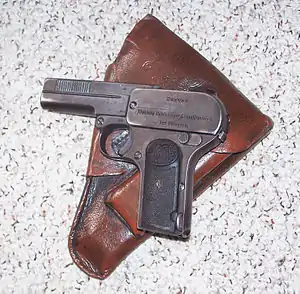 |
Dreyse M1907 | Rheinmetall | 7.65×17mm SR | Wehrmacht Volksturm |
- | [6] |
.jpg.webp) |
FÉG 37M | Fémárú, Fegyver- és Gépgyár | 7.65×17mm SR | Luftwaffe | Examples produced for German use included a manual safety, which was absent from the Hungarian-issue version. Designated Pistole 37(u) in German service. | [7] |
 |
FN Model 1910 | Fabrique Nationale de Herstal | 7.65×17mm Browning | Wehrmacht Luftwaffe |
The FN M1910 was produced under the German occupation. Designated "Pistole 621" in German service. | - |
 |
FN Model 1922 | Fabrique Nationale de Herstal | 7.65×17mm Browning 9×17mm Browning |
Wehrmacht Luftwaffe SS Reich Government Officials (de) |
The FN M1922 was mainly produced for the Luftwaffe, Also used by Wehrmacht, SS, Reich Government Officials, but oddly enough was still sold commercially up until 1942. | - |
 |
Kongsberg Colt | Kongsberg Vaapenfabrikk | 11.43x23mm ACP | Wehrmacht | 8200 were produced under German occupation. Designated "Pistole 657" in German service. | - |
.jpg.webp) |
Luger P08 pistol | Deutsche Waffen und Munitionsfabriken Mauser-Werke |
9×19mm Parabellum | Wehrmacht Luftwaffe Waffen-SS |
The Luger P08's production was taken over by Mauser after World War I.[8] | [9] |
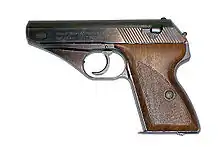 |
Mauser HSc | Mauser-Werke | 7.65×17mm SR | Kriegsmarine Heer Luftwaffe Waffen-SS |
Originally produced as a commercial pistol, The Mauser HSc was fully adopted by the German Navy and Air force.[10] | [11] |
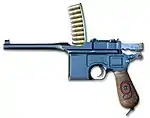 |
Mauser C96 | Mauser-Werke | 7.63×25mm Mauser 9×19mm Parabellum |
Wehrmacht Waffen-SS |
- | [11] |
 |
MAB Model D | Manufacture d'Armes de Bayonne | 7.65×17mm Browning SR | Wehrmacht | After German forces occupied France, the MAB Model D was adopted for use by the Wehrmacht during World War II. | |
.jpg.webp) |
Radom wz.35 Vis | Łucznik Arms Factory, Radom | 9×19mm Parabellum | Fallschirmjäger Feldgendarmerie |
Designated Pistole 645(p) in German service. | [12] |
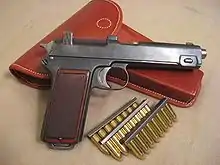 |
Steyr M1912 | Steyr Mannlicher | 9×19mm Parabellum 9×23mm Steyr |
Wehrmacht | When the Austrian Army was absorbed, existing Steyr M1912 pisols were rechambered to fire 9mm Parabellum rounds.[13] Designated Pistole 12(ö) in German service. | [14]> |
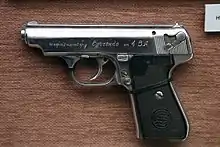 |
Sauer 38H | Sauer & Sohn | 7.65×17mm SR | Wehrmacht Luftwaffe |
The manual safety on the Sauer 38H was excluded on pistols produced between 1944 and 1945.[13] | [15] |
| Star Model B | Star Bonifacio Echeverria | 9×19mm Parabellum | Luftwaffe | 25,000 delivered prior to liberation of France. | [1] | |
| - | Volkspistole | Mauser-Werke Carl Walther GmbH |
9×19mm Parabellum | Volksturm | An emergency weapon production can be traced to Mauser and Walther but full identification is still uncertain.[16] | [17] |
 |
Walther P38 | Carl Walther GmbH Mauser-Werke Spreewerke GmbH |
9×19mm Parabellum | Wehrmacht Luftwaffe Waffen-SS |
480,000 Walther P38s were made by 1945 for the German military.[18] | [19] |
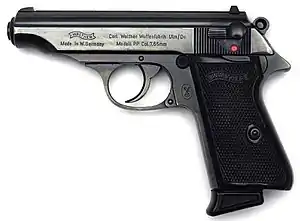 |
Walther PP | Carl Walther GmbH | 7.65×17mm SR | Wehrmacht Luftwaffe Panzergrenadier Waffen-SS |
- | [19] |
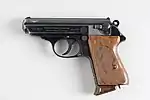 |
Walther PPK | Carl Walther GmbH | 7.65×17mm SR 9×17mm Kurz |
Wehrmacht Luftwaffe Waffen-SS |
- | [19] |
Rifles
| Picture | Name | Manufacturer | Cartridge | Primary User | Note | References |
|---|---|---|---|---|---|---|
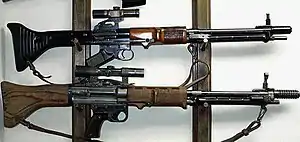 |
Fallschirmjägergewehr 42 | Rheinmetall-Borsig Heinrich Krieghoff Waffenfabrik L. O. Dietrich |
7.92×57mm Mauser | Fallschirmjäger | Approximately 2,000 produced of first variation, 5,000 of second and third variations. | |
| Gewehr 24(t) | Československá Zbrojovka Brno | 7.92×57mm Mauser | Wehrmacht | Modification of Czechoslovak vz. 24 rifle to more closely conform with standard-issue Karabiner 98k. 330,050 produced in occupied Czechoslovakia from 1938 to 1943. | ||
| Gewehr 29/40(ö) | FB "Łucznik" Radom | 7.92×57mm Mauser | Kriegsmarine | Modification of Polish vz. 29 rifle to more closely conform with standard-issue Karabiner 98k. The factory was run by the Austrian firm Steyr. | ||
| Gewehr 33/40(t) | Československá Zbrojovka Brno | 7.92×57mm Mauser | Wehrmacht | Adaptation of Czechoslovak vz. 33. 131,503 produced from 1940 to 1942 for German use. | ||
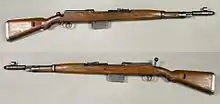 |
Gewehr 41(M) | Mauser-Werke | 7.92×57mm Mauser | Wehrmacht | Mauser self-loading rifle design tested in 1941, not accepted for service. | |
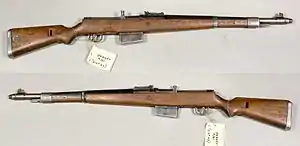 |
Gewehr 41(W) | Carl Walther GmbH | 7.92×57mm Mauser | Wehrmacht | Walther self-loading rifle adopted as standard in 1942 but superseded by improved Gewehr 43. | |
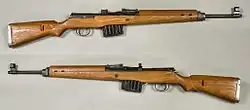 |
Gewehr 43/Karabiner 43 | Carl Walther GmbH | 7.92×57mm Mauser | Wehrmacht Waffen-SS |
Modification of Gewehr 41(W) to gas operation, later renamed Karabiner 43. | |
 |
Gewehr 88 | Steyr-Mannlicher various others |
M/88 7.92×57mm Mauser |
Volksturm | The Gewehr 88 was the first rifle adopted by Germany that used Smokeless powder. | |
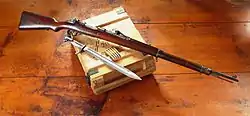 |
Gewehr 98 | Mauser-Werke various others |
7.92×57mm Mauser | Wehrmacht SS Volkssturm |
Standard German infantry rifle of World War I. Saw limited use in World War II, including issue to Adolf Hitler's SS bodyguard unit. | |
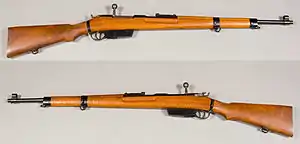 |
Gewehr 98/40 | Fémárú, Fegyver- és Gépgyár | 7.92×57mm Mauser | Wehrmacht | Adaptation of Hungarian 35M rifle to fire 7.92×57mm Mauser ammunition and to mount German bayonets. 138,400 produced from 1941 to 1944. | [20] |
| Karabiner 98a | Mauser-Werke various others |
7.92×57mm Mauser | Wehrmacht | |||
| Karabiner 98b | Mauser-Werke various others |
7.92×57mm Mauser | Wehrmacht | |||
 |
Karabiner 98k | Mauser-Werke various others |
7.92×57mm Mauser | Wehrmacht Kriegsmarine Luftwaffe Waffen-SS |
Adopted as standard German infantry rifle in 1935. Over 14 million produced from 1934 until German surrender. | |
.jpg.webp) |
Maschinenkarabiner 42(H) | C. G. Haenel | 7.92×33mm Kurz | Wehrmacht | Accepted after troop trials in 1943, about 8,000 produced. Served as basis for MP 43. | |
.jpg.webp) |
Maschinenkarabiner 42(W) | Carl Walther GmbH | 7.92×33mm Kurz | Wehrmacht | A competitor of the Maschinenkarabiner 42(H) from Walther. About 3,000-5,000 produced. | |
| M30 Luftwaffe drilling | Sauer & Sohn | 9.3x74mmR, 12 Gauge[21] | Luftwaffe | Issued as survival weapon for Luftwaffe aircrews. | [22] | |
 |
Sturmgewehr 44 | C. G. Haenel | 7.92×33mm Kurz | Wehrmacht Waffen-SS |
Evolved from MKb 42(H). First series completed in July 43, first combat use in Eastern Front. Initially named Maschinenpistole 43 and then Maschinenpistole 44. | |
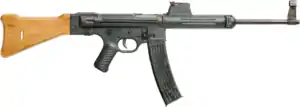 |
Sturmgewehr 45(M) | Mauser-Werke | 7.92×33mm Kurz | Wehrmacht | Experimental lightweight selective-fire weapon, with roller-locked blowback system, only prototypes built prior to end of war. Forefunner of the Spanish CETME 58. | |
| Volkssturmgewehr/Gewehr 1-5 | Gustloff-Werke | 7.92×33mm Kurz | Volkssturm | Intended as a cheap and mass-produced self-loading, semi-automatic weapon. First series completed in late 1944. | ||
| Sturmgewehr 1-5 | - | 7.92x33mm Kurz | Volkssturm | A proposed version of the Gewehr 1-5 that had a firing-selector, and could be switched from fully-automatic and semi-automatic. |
.
Machine guns
| Picture | Name | Manufacturer | Cartridge | Primary User | Note | References |
|---|---|---|---|---|---|---|
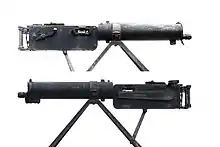 |
Maschinengewehr 08 | DWM Spandau Erfurt |
7.92×57mm Mauser | Wehrmacht | Standard machine gun of World War I. Saw limited use in World War II. | |
.jpg.webp) |
MG 15 | Rheinmetall | 7.92×57mm Mauser | Luftwaffe Wehrmacht |
The MG 15 was at the beginning of the war mainly used on aircraft of the Luftwaffe. After being replaced by other machine guns many MG 15s were modified for use by ground forces. | |
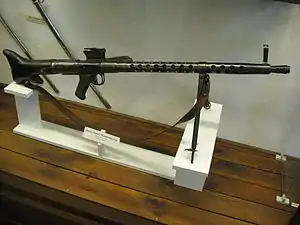 |
Maschinengewehr 30 | Steyr-Daimler-Puch | 7.92×57mm Mauser | Luftwaffe Wehrmacht |
Rejected by the Reichswehr but accepted by the Luftwaffe for aircraft use. Later transferred to Wehrmacht ground units. | |
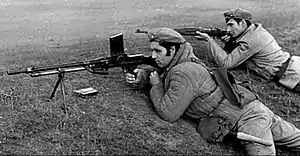 |
Maschinengewehr 30(t) | Československá Zbrojovka Brno | 7.92×57mm Mauser | Waffen-SS | Czechoslovak ZB vz. 30 produced under German occupation for Waffen-SS use. | |
| Maschinengewehr 34 | Mauser-Werke various others |
7.92×57mm Mauser | Wehrmacht Kriegsmarine Luftwaffe Waffen-SS |
Adapted from MG30 and adopted as standard machine gun in 1934. Issued to German troops starting in 1935. | ||
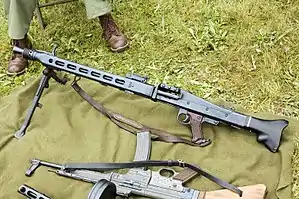 |
Maschinengewehr 42 | Mauser-Werke Steyr-Daimler-Puch Gustloff Werke |
7.92×57mm Mauser | Wehrmacht Luftwaffe Waffen-SS |
Successor to MG34, adopted in 1942. Over 400,000 produced prior to German surrender. | |
| MG 45 | n/a | 7.92×57mm Mauser | n/a | Emergency alternative to the MG42. | ||
| Barnitzke machine gun | n/a | 7.92×57mm Mauser | n/a | Proposed MG42 replacement using an unusual delayed blowback operation. | ||
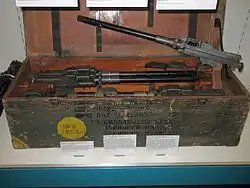 |
MG 81 | n/a | 7.92×57mm Mauser | n/a | Machine gun used by the Luftwaffe. |
Submachine guns
| Picture | Name | Manufacturer | Cartridge | Primary User | Note | References |
|---|---|---|---|---|---|---|
| Beretta Model 38/42 | Beretta | 9×19mm Parabellum | Wehrmacht Waffen-SS Fallschirmjäger |
Designated Maschinenpistole 738(i) in German service. | ||
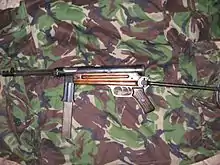 |
Beretta Model 38/44 | Beretta | 9×19mm Parabellum | Wehrmacht Waffen-SS Fallschirmjäger |
Designated Maschinenpistole 739(i) in German service. | |
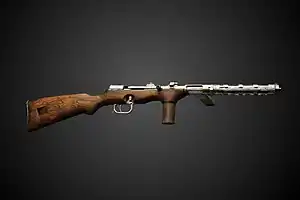 |
Erma EMP | Československá Zbrojovka Brno | 9×19mm Parabellum | Waffen-SS | Not officially adopted, but used in small numbers by the Waffen-SS. | [23] |
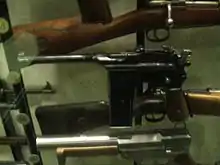 |
Mauser M712 Schnellfeuer | Mauser-Werke | 7.63×25mm Mauser | Wehrmacht | Select-fire, removable-magazine version of the Mauser C96 pistol. | |
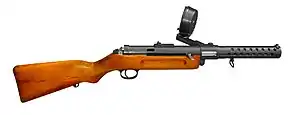 |
MP18 | Bergmann Waffenfabrik | 9×19mm Parabellum | Wehrmacht | ||
 |
MP28 | Bergmann Waffenfabrik | 9×19mm Parabellum | Wehrmacht | Improved version of MP18. | |
| MP34 | Waffenfabrik Steyr | 9×19mm Parabellum 9×23mm Steyr |
Wehrmacht Waffen-SS Feldgendarmerie |
Designed by Rheinmetall but produced in Austria by Steyr to evade Treaty of Versailles restrictions. After the Anschluss, produced from 1938 to 1940 for the Waffen-SS. Pre-Anschluss Austrian examples designated Maschinenpistole 34(ö) in German service. | ||
 |
MP35 | Bergmann | 9×19mm Parabellum | Wehrmacht Waffen-SS |
Produced from 1935 to 1944. Used primarily by the Waffen-SS. | |
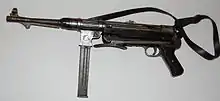 |
MP38 | Erma Werke | 9×19mm Parabellum | Wehrmacht Waffen-SS Fallschirmjäger |
||
 |
MP40 | Erma Werke | 9×19mm Parabellum | Wehrmacht Waffen-SS Fallschirmjäger |
The MP40 is an improved version of MP38, utilizing stamped metal parts for easier mass production. | |
| MP41 | Haenel | 9×19mm Parabellum | Waffen-SS | Combined the receiver, operating mechanism, and magazine housing of the MP40 and the stock, trigger and fire selector of the MP28. | ||
 |
MP3008 | - | 9×19mm Parabellum | Wehrmacht Volkssturm |
Based on British Sten Mk II, designed as an easy to manufacture last-ditch weapon. Approximately 10,000 produced in 1945. | |
| Suomi KP/-31 | Tikkakoski Oy | 9×19mm Parabellum | Wehrmacht Waffen-SS |
3,042 purchased from Finland. | ||
| - | ZK-383 | Československá Zbrojovka Brno | 9×19mm Parabellum | Waffen-SS | Produced in occupied Czechoslovakia for Waffen-SS use. | [24] |
Anti-tank weapons
| Picture | Name | Manufacturer | Cartridge | Primary User | Note | References |
|---|---|---|---|---|---|---|
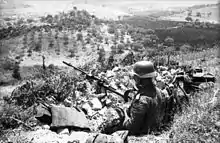 |
Granatbüchse 39 | Gustloff Werke | - | Wehrmacht | Conversion of Panzerbüchse 39 to launch rifle grenades. | |
| - | Panzerbüchse 38 | Gustloff Werke | 7.92×94mm | Wehrmacht | ||
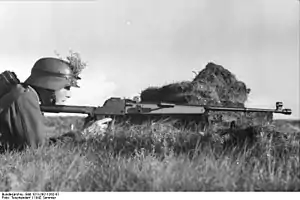 |
Panzerbüchse 39 | Gustloff Werke | 7.92×94mm | Wehrmacht | Improved version of Panzerbüchse 38. | |
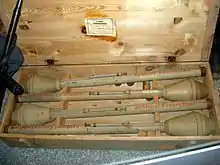 |
Panzerfaust | - | 100mm anti-tank grenade | Wehrmacht Waffen-SS Volksturm |
Disposable recoilless single-shot anti-tank grenade launcher. | |
 |
Raketenpanzerbüchse 43 | - | 88mm rocket | Wehrmacht Waffen-SS |
Popularly referred to as Panzerschreck. Enlarged version of American M1A1 Bazooka. | |
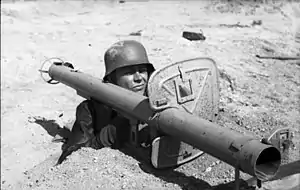 |
Raketenpanzerbüchse 54 | - | 88mm rocket | Wehrmacht Waffen-SS |
Improved version of the Raketenpanzerbüchse 43, adding a blast shield. | |
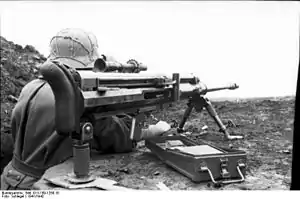 |
Solothurn S-18/1000 | Solothurn | 20×138mmB | Wehrmacht Waffen-SS |
||
| - | Solothurn S-18/1100 | Solothurn | 20×138mmB | Wehrmacht Waffen-SS |
Full-automatic version of the Solothurn S-18/1000. | |
 |
Sturmpistole | - | - | Wehrmacht | Modification of standard flare guns to launch grenades. |
Other weapons
| Picture | Name | Manufacturer | Primary User | Note | References |
|---|---|---|---|---|---|
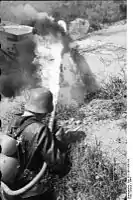 |
Flammenwerfer 35 | Various | Wehrmacht | Later succeed by improved Flammenwerfer 41 | - |
| - | Einstossflammenwerfer 46 | Various | Fallschirmjäger | Cheap produced variant produced for the Volkssturm or the Werwolf movements. | - |
See also
- List of equipment used in World War II
- List of German military equipment of World War II
- List of World War II Luftwaffe aircraft weapons
- List of aircraft of the World War II Luftwaffe
- List of common World War II infantry weapons
- List of secondary and special issue World War II infantry weapons
- German General Staff - a post-1933 section to understand the variety of the above list.
- List of rifle cartridges
- List of handgun cartridges
- List of firearms
- Glossary of World War II German military terms
- Captured US firearms in Axis use in World War II
- German designations of foreign firearms in World War II
References
- Citations
- Walter (2004), pp. 110–111.
- Hogg & Walter (2004), p. 111.
- Fowler & Stronge (2007), p. 136.
- Hogg & Walter (2004), p. 355.
- Walter (2004), p. 105.
- Hogg & Walter (2004), p. 265.
- Kokalis, Peter (2005). "Hungarian Small Arms in Germany's Service". Shotgun News. 59 (36): 12–13.
- McNab (2004), p. 130.
- Hogg & Weeks (2000), p. 41.
- Hogg & Weeks (2000), p. 46.
- Fowler & Stronge (2007), p. 160.
- Bishop, Chris (2006). The Encyclopedia of Small Arms and Artillery. Grange Books. pp. 13–14. ISBN 978-1-84013-910-5.
- Hogg & Weeks (2000), p. 16.
- Fowler & Stronge (2007), p. 179.
- McNab (2004), p. 159.
- Hogg & Walter (2004), p. 148.
- Hogg & Weeks (2000), p. 47.
- Hogg & Walter (2004), p. 365.
- Fowler & Stronge (2007), p. 162.
- "Mannlicher Gew.98/40 German Infantry Rifle". Manowar's Hungarian Weapons. Archived from the original on September 2, 2012. Retrieved June 10, 2012.
- Fjestad, S.P. (2009). Blue Book of Gun Values 2009. Blue Book Publications. p. 1318. ISBN 1-886768-87-0.
- Kokalis, Peter (May 10, 2009). "Luftwaffe drilling: world's most expensive survival arm". Shotgun News: 26–30. Archived from the original on December 9, 2017. Retrieved June 9, 2012.
- "Modern Firearms - EMP.35 Erma". world.guns.ru. Archived from the original on 2012-06-21. Retrieved 2012-06-11.
- "Modern Firearms - Zk-383". world.guns.ru. Archived from the original on 2012-06-16. Retrieved 2012-06-11.
- Bibliography
- Fowler, Anthony North; Stronge, Charles (2007). Pistols, Revolvers, and Submachine Guns. JG Press. ISBN 1-57215-595-7.
- Hogg, Ian; Weeks, John (2000). Military Small Arms of the 20th Century (7th ed.). Krause Publications. ISBN 0-87341-824-7.
- Hogg, Ian; Walter, John (2004). Pistols of the World (4th ed.). Krause Publications. ISBN 0-87349-460-1.
- Kinard, Jeff (2003). Pistols: an illustrated history of their impact. ABC-CLIO. ISBN 1-85109-470-9.
- McNab, Chris (2004). The Great Book of Guns. Thunder Bay Press. ISBN 1-59223-304-X.
- Walter, John (2004). Guns of the Third Reich. Greenhill Books. ISBN 978-1-85367-598-0.
This article is issued from Wikipedia. The text is licensed under Creative Commons - Attribution - Sharealike. Additional terms may apply for the media files.